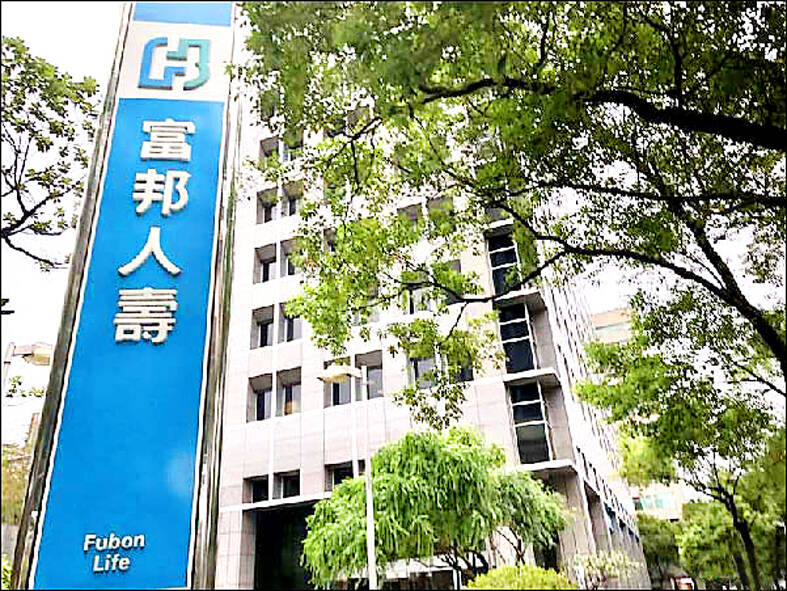Fubon Life Insurance Co (富邦人壽) plans to issue NT$50 billion (US$1.54 billion) of subordinated corporate bonds — on top of the NT$25 billion it issued in the first half of the year — to bolster its financial strength, parent company Fubon Financial Holding Co (富邦金控) said in a regulatory filing yesterday.
The subordinated bonds, with a maturity date of 10 years or longer, would be issued in one or several tranches within one year through public offerings, the filing said.
Fubon Life and its local peers have been gearing up to issue new debt to strengthen their financial structure and increase their risk-based capital ratio, as Taiwan’s insurance sector is to adopt the International Financial Reporting Standard 17 (IFRS 17) and the new Insurance Capital Standard framework in 2026.

Photo: Kelson Wang, Taipei Times
A subordinated bond is a type of debt that ranks lower in priority, with respect to claims on assets in case of bankruptcy or liquidation.
Long-term subordinated bonds have increasingly become a favored channel for life insurers to raise funds, as they are popular among investors in the Taiwanese fixed-income market, given their relatively higher yields.
Fubon Life’s board has authorized the company’s chairman or any designated person to decide the coupon rate of the new offering depending on market conditions, the filing said.
Earlier this year, Fubon Life sold NT$14.88 billion of 10-year subordinated bonds with a coupon rate of 3.7 percent, and NT$10.12 billion of 15-year bonds with a coupon rate of 3.85 percent, Taipei Exchange data showed.
In April, Cathay Life Insurance Co (國泰人壽), the nation’s largest insurer, also announced that it would issue up to NT$50 billion in subordinated bonds, offering 3.7 percent for 10-year debt and 3.85 percent for 15-year debt, exchange data showed.
So far this year, six life insurers — which also include Nan Shan Life Insurance Co (南山人壽), KGI Life Insurance Co (凱基人壽), Shin Kong Life Insurance Co (新光人壽) and Mercuries Life Insurance Co (三商美邦人壽) — have announced plans to issue subordinated bonds to raise funds.
The sector sold a record-high NT$111 billion in subordinated debt last year, data compiled by the Financial Supervisory Commission showed.

UNCERTAINTY: Innolux activated a stringent supply chain management mechanism, as it did during the COVID-19 pandemic, to ensure optimal inventory levels for customers Flat-panel display makers AUO Corp (友達) and Innolux Corp (群創) yesterday said that about 12 to 20 percent of their display business is at risk of potential US tariffs and that they would relocate production or shipment destinations to mitigate the levies’ effects. US tariffs would have a direct impact of US$200 million on AUO’s revenue, company chairman Paul Peng (彭雙浪) told reporters on the sidelines of the Touch Taiwan trade show in Taipei yesterday. That would make up about 12 percent of the company’s overall revenue. To cope with the tariff uncertainty, AUO plans to allocate its production to manufacturing facilities in

TAKING STOCK: A Taiwanese cookware firm in Vietnam urged customers to assess inventory or place orders early so shipments can reach the US while tariffs are paused Taiwanese businesses in Vietnam are exploring alternatives after the White House imposed a 46 percent import duty on Vietnamese goods, following US President Donald Trump’s announcement of “reciprocal” tariffs on the US’ trading partners. Lo Shih-liang (羅世良), chairman of Brico Industry Co (裕茂工業), a Taiwanese company that manufactures cast iron cookware and stove components in Vietnam, said that more than 40 percent of his business was tied to the US market, describing the constant US policy shifts as an emotional roller coaster. “I work during the day and stay up all night watching the news. I’ve been following US news until 3am

Taiwan will prioritize the development of silicon photonics by taking advantage of its strength in the semiconductor industry to build another shield to protect the local economy, National Development Council (NDC) Minister Paul Liu (劉鏡清) said yesterday. Speaking at a meeting of the legislature’s Economics Committee, Liu said Taiwan already has the artificial intelligence (AI) industry as a shield, after the semiconductor industry, to safeguard the country, and is looking at new unique fields to build more economic shields. While Taiwan will further strengthen its existing shields, over the longer term, the country is determined to focus on such potential segments as

COLLABORATION: Given Taiwan’s key position in global supply chains, the US firm is discussing strategies with local partners and clients to deal with global uncertainties Advanced Micro Devices Inc (AMD) yesterday said it is meeting with local ecosystem partners, including Taiwan Semiconductor Manufacturing Co (TSMC, 台積電), to discuss strategies, including long-term manufacturing, to navigate uncertainties such as US tariffs, as Taiwan occupies an important position in global supply chains. AMD chief executive officer Lisa Su (蘇姿丰) told reporters that Taiwan is an important part of the chip designer’s ecosystem and she is discussing with partners and customers in Taiwan to forge strong collaborations on different areas during this critical period. AMD has just become the first artificial-intelligence (AI) server chip customer of TSMC to utilize its advanced